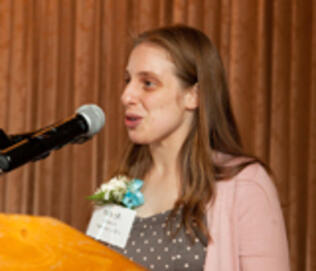
Creative Writing Award Winner - 2008
Class of 2011
Ayelet Amittay, 11 received a Bachelor of Arts in psychology and comparative literature from Brown University, Magna Cum Laude and a Master of Fine Arts from the University of Michigan in creative writing. A member of Phi Beta Kappa and a published poet, she is a winner of the Elie Wiesel Prize in Ethics for an essay on the holocaust and the Rosalie Colie prize for her thesis. She is currently in her first year at YSN, where she is studying to become a Family Nurse Practitioner.
Listen to Ayelet Amittay’s Body Bag as a netcast on Yale’s iTunesU
Transcript of the Reading:
Body Bag
The first time we meet, he is lying in bed with the blankets pulled up to his chin. Most patients on the oncology floor like to have the blankets folded neatly across their laps, or else, delirious, twist the sheets into knots around their bodies. But he has pulled the sheets up like a child afraid of the dark. I introduce myself, ask how he is feeling, and his answers are pleasant, gentle. But every ten or fifteen seconds he breaks eye contact to lift the edge of the covers and peek under them, down, towards his belly.
In his chart a nurse has written that he is “not accustomed” to his ostomy bag and that it is “disturbing” to him. It has been more than a year since the cancer required a surgeon to slit open his abdomen, remove a length of colon, and open a new elimination route in his left side. To me, a new nursing student, it seems totally comprehensible that he would not want me to see the ostomy bag with its liquid feces, the humiliation of private bodily functions turned public. So I do not ask him to turn the covers down and let me check the bag. Instead I offer forms of comfort that will not breach his privacy: I check vital signs, ask him about the pain that shoots down his hips and legs like twin lightning bolts, offer him a foot massage. “Too much trouble,” he says with a flap of his hand, “I feel ridiculous.” He only relents when I tell him it’s part of my duty as a nursing student, the preceptor will be upset if she finds out I didn’t do it-anything to make him more comfortable. He lets me pull the covers back, up to his knees.
His feet are cracked and dry from the chemo. These pains he suffers are thought to be caused by the new drugs he’s on for the newest wave of cancer. He does not complain about the chemo or cancer, only about the pain in his legs-enough to stay with the one complaint, to not be overwhelmed by the larger rings of suffering. I slide my lotioned thumbs between his toes and over the balls of his feet. I tell him that in China, where I lived for a semester, pressure points on the foot correspond to different places in the body. He tells me he taught high-school history and loved to teach about the Great Wall, how it wasn’t built all at once but in pieces. Like our connection, stone by stone.
He seems warmed by our talking, so I keep going, I am waiting until he is really comfortable to ask about the bag. Why turn his attention from the fullness of his life outside the hospital to the broken places of his body? Why say to him, what I really want to see is not you but the plastic sack that hangs from you like a feedbag, inhuman?
I leave the room to get a towel and when I come back there are two med techs and a nurse surrounding the bed. His bag has exploded. But they have already stripped the bed, rolled him gently onto his side (a pillow propping his hurting hips) to clean him. I run for washcloths. I help support his legs. And I watch as Nancy, the veteran med tech, applies the new ostomy bag. I see the ostomy, a pink healthy pucker sewn into his skin, an open O. She explains to me-but also, I realize now, to him-how important it is to seal the bag cleanly to prevent skin breakdown and leaking, how I should check and drain the bag every 15 minutes. How lovingly the bag closes over the pink flesh, like an embrace. He exclaims over her handiwork, nods over the instructions like a teacher listening to a thoughtful student. He is sorry to be a burden, he says, but I hear in his voice a distinct change from the foot-massage apologies: gratitude rather than guilt. She is so good that she makes the caretaking look natural, and she makes the whole situation seem natural too. The ostomy bag, the cancer-not ideal, certainly, but nothing to tiptoe around, as I had done.
For the rest of the night I check and drain the bag, measuring his losses. I apologize for checking frequently, and inexpertly. He assures me it is all right. Now that his shame has been exposed and renamed as a part of him– now that Nancy solved with knowledge and gentleness the problem set posed by his condition– he trusts that he can leave the blankets down. He is a history teacher and knows that the past predicts the future. And he has taught me, too, a lesson about caring: I must leave the comfort zone, his and mine. It is the most uncomfortable places that are the starting points of nursing, openings to make comfort where there is none.
